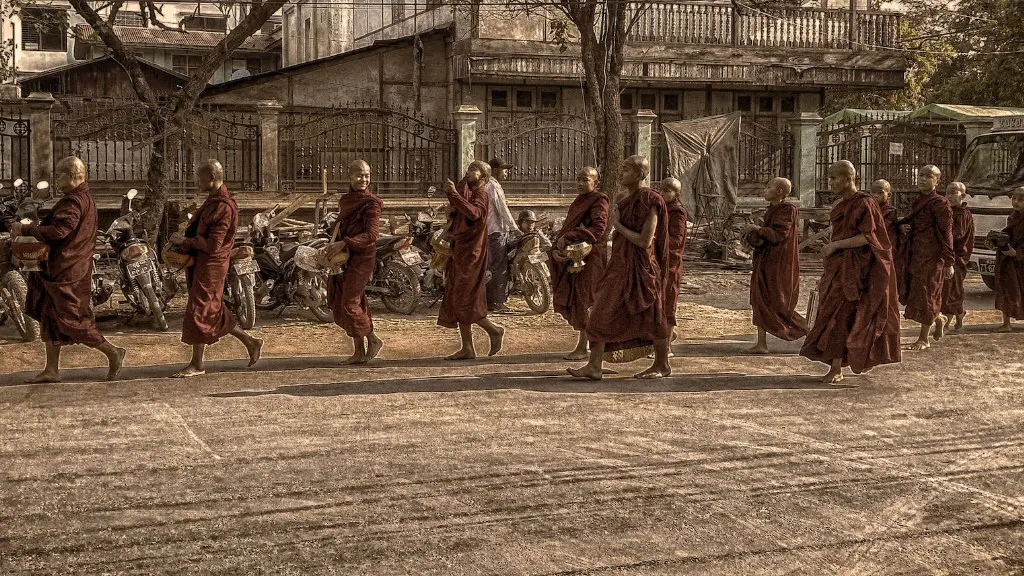Most people believe that Roman Catholicism is a form of Christianity. Although this is true to an extent, there are some distinct differences between the beliefs and practices of both religions. To understand whether Roman Catholic is a form of Christianity, it is important to understand what Christianity is, what the Catholic Church teaches and why the two are often intertwined.
Generally, Christianity is a religion based on the belief that Jesus is the son of God. Different denominations within Christianity focus on varying interpretations of the Bible and its teachings, as well as how to live out one’s faith. Roman Catholicism is one such denomination, and it is the world’s largest Christian denomination. The Church maintains that it is led by the Holy See, which has its seat in the Vatican in Rome. Furthermore, Roman Catholic doctrines maintain that it is the one true Church with the only valid beliefs and practices.
While Christianity is a religion based on belief in Jesus, the Roman Catholic Church goes beyond that to maintain that Jesus appointed the apostles to be his representatives on Earth and carry out his will. This means that the Church believes it is the custodian of Jesus’s spiritual legacy, and believes that the Church is integral for understanding and living out the teachings of Jesus. Therefore, the Church governs itself using the teachings and principles introduced by Jesus during his life on Earth.
Central to the Church’s beliefs are the seven sacraments, which are symbolic rituals that represent the cardinal virtues of Christianity: Baptism, Reconciliation, Confirmation, Marriage, Anointing of the Sick, Eucharist and Holy Orders. These seven sacraments recognize the importance of the passage of time, man’s relationship with God and Jesus’s role in salvation. For example, the Eucharist is believed to be a representation of the Last Supper. It is therefore clear that Roman Catholicism is not simply a Christian denomination; it is complex and often times hard to understand religion.
At the same time, the Roman Catholic Church shares numerous similarities with other Christian denominations. For instance, the Church places a strong emphasis on the teachings of Jesus, such as the golden rule, taking care of the poor, and treating others with respect and kindness. Moreover, Roman Catholics also celebrate many of the same festivals as other Christian denominations, such as Christmas and Easter. The Church also believes in God and the Holy Trinity, similar to other denominations.
In conclusion, it is undeniable that Roman Catholicism is a form of Christianity, albeit with unique beliefs and practices. It is important to remember that the two religions share the same core belief and the same faith, even if there are differences in the rituals and ceremonies. Thus, Roman Catholicism is a variation of Christianity, connected to it by the same fundamental beliefs and faith.
Sacred Texts
Sacred texts are important components of every religion. Christianity is no different, and the Bible is the main source of worship in the Roman Catholic Church. It is divided into the Old Testament, which covers the time before Jesus, and the New Testament, which covers the time after Jesus. Sacred texts such as scriptures and creeds are fundamental to the beliefs of Roman Catholicism, and they provide the foundation and teachings of the Church. Additionally, the Catechism of the Catholic Church is a compendium of all the teachings of the Church that must be understood and practiced in order to lead a truly Catholic life.
Apart from the Bible, Catholics also read key texts from early Church councils, known as the Magisterium, and from the writings of Church fathers, doctors and saints. These sources are all authorised by the Church and include documents such as the Nicene Creed (325), the Lateran Council (1215) and the Council of Trent (1545). Scripture, the Catechism and the precedents of Church councils and early Church Fathers provide the framework for Roman Catholic beliefs.
The Catechism also highlights the importance of listening to the Word of God in sacred scripture, as well as the Church’s interpretation of it. Catholics attend Mass every Sunday, which is a ceremony that centres on hearing and responding to a biblical reading. This reading and interpretation is the core of the Church’s theology and spreading the message of Jesus. In the Mass, believers gather to hear the Word of God and respond to the message. This is the foundation of the Roman Catholic faith.
The Sacraments
The seven sacraments are the bread and butter of the Roman Catholic Church. They provide Catholics with tangible activities to express their faith and encounter Jesus Christ in a physical way. The seven sacraments are Baptism, Reconciliation, the Eucharist, Confirmation, Marriage, Anointing of the Sick and Holy Orders. These seven sacraments are provided to give believers tangible methods to participate in the life and mission of Jesus Christ. Through these sacraments, the Church believes that Catholics are able to participate in the redeeming work of Jesus that was accomplished in his life, death and resurrection.
The sacraments are forms of grace that bring Catholics into deeper communion with God. Through the sacraments, the Church believes that Catholics are able to gain access to divine grace, which is necessary for salvation. The Church believes that through the sacraments, Catholics can access the presence of Jesus, the power of his Holy Spirit, the mercy of his Father and the Church’s intercession. The celebration of the sacraments is thus integral to the faith and life of Roman Catholics.
Moreover, the sacraments shape Catholic identity and morality as Catholics often emulate the behaviour and traditions of Jesus. It also serves as a reminder of Jesus’s presence and his role in salvation. Through the sacraments, Catholics are not only able to encounter Jesus and access grace but to fully participate in the mission of Jesus. The sacraments provide believers with a tangible way to follow in the footsteps of Jesus, to be part of a larger Church community, to grow in holiness and serve others.
The Role of the Pope
The Pope is the leader of the Roman Catholic Church. Pope Francis is the 266th Pope and the head of the Vatican. The Pope is the successor of St. Peter, whom Jesus Himself chose to be the head of His Church on Earth. The Pope is known as the Vicar of Christ on Earth and is seen as the rightful leader for Catholics. He is considered the chief pastor of the Church and the supreme pontiff, and is given the responsibility of leading the Church on Earth.
The Pope is the supreme teacher of Roman Catholic doctrine and belief. He has the authority to guide and shape the entire Church, and his writings and teachings are seen as authoritative. The Pope is also the successor of St. Peter, and this is why the papal office carries such significance in the Roman Catholic Church. The Pope speaks and acts as the Church’s representative on Earth, and Catholics are expected to show their loyalty and obedience to the Pope.
The Pope is an important figure in the Church and is seen as a leader of worldly and spiritual matters. He is a universal sign of unity and peace, and his papal writings are respected and studied as a source of instruction and guidance. In addition, the Pope has the authority to convene ecumenical councils and to issue decrees that are binding on all Catholics. The Pope is a powerful symbol for the Church, and his papal authority is the cornerstone of Roman Catholicism.
The Role of Mary
The third key figure in the Roman Catholic Church is Mary, the mother of Jesus. Mary is considered to be a saint, who is respected and venerated within the Church. She occupies a unique place in the history of salvation, and is seen as a model of how every Christian should respond to the will of God.
For Catholics, Mary is a symbol of faith and obedience. She is seen as a witness to all that Jesus said and did, a model of discipleship and love, and the embodiment of God’s grace and mercy. She is honoured and celebrated in the Church, as Catholics believe that her obedience to the will of God is fundamentally important to understanding Jesus’s mission. The Church teaches that Mary was the chosen vessel to bring the Word of God into the world, and she is seen as a symbol of God’s salvation and mercy.
Moreover, Mary is seen as a powerful intercessor for the Church. The Church teaches that Mary is an intermediary between God and the Church, and so she can intercede on believers’ behalf. This is because Mary is seen as having an intimate relationship with Jesus, and her prayers for the Church can be powerful. Catholics also believe that Mary can intercede for sinners and that she can help believers to become closer to Jesus.
The Role of the Saints
The saints are important figures in the Roman Catholic Church. All the saints, especially those recognised by the Church, are recognised as having a special status in the life of the Church. Catholics believe that the saints provide examples of holiness and that they can serve as intercessors for the Church. This intertwining of earthly and heavenly life is part of the Roman Catholic Church’s teachings and beliefs.
The Church teaches that the saints are models of purity and holiness, and that they are an inspiration to all Catholics. For example, St. Augustine is seen as a role model for reflection and contemplation, and St. Francis of Assisi is seen as a model of humility, poverty and charity. Furthermore, the Church teaches that the saints can intercede for the Church on Earth and serve as intermediaries for prayer and communion with God. Catholics turn to saints for comfort, guidance and direction, and the saints are often seen as advocates of the Church on Earth.
Additionally, the Church venerates the saints in a special way. Catholics celebrate their feast days and celebrate the lives of the saints. The Church also teaches that saints can offer spiritual guidance to believers, and that their holiness and examples are able to lead others to a closer relationship with God. Catholics therefore put a great emphasis on the saints and their role in the Church, and they believe that their presence in the Church is of immense spiritual importance.

